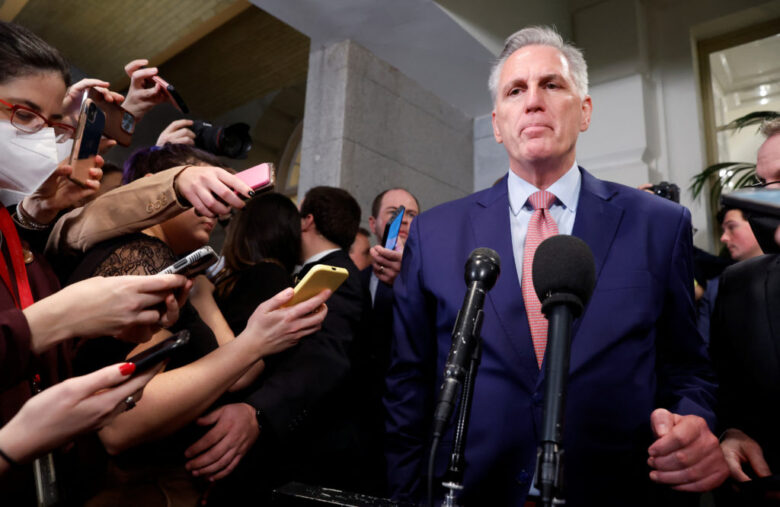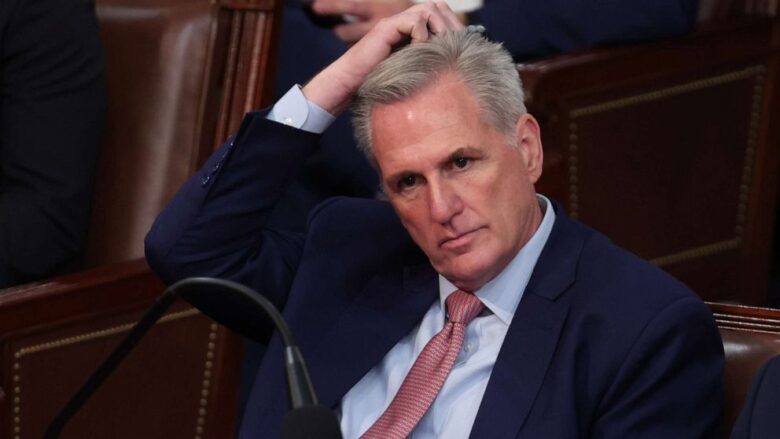The election for Speaker of the U.S. House of Representatives (435-member House) began an unusual second day of voting on January 4, with three rounds of voting, but the hard right wing of the majority party, the Republican Party, continued to build opposition, and House Majority Leader Kevin McCarthy failed to receive the necessary majority vote. The House reconvened after a break, but voted to adjourn until noon on January 5.
McCarthy had earlier indicated that a vote this evening would not lead to a change in the situation. This is the first time since 1923 that the House has voted again for the Speaker of the House.

The new-look House, which convened on January 3 following the results of last November’s midterm elections, has 222 Republican members. House Majority Leader McCarthy needs the support of 218 members to become Speaker, but about 20 hard-right members of the party continue to defy him.
On the day of the vote, the hard right wing of the Republican Party endorsed Rep. Byron Donalds (D-FL) as the candidate to replace House Majority Leader McCarthy; on the fourth ballot, Republicans gave McCarthy 201 votes, Donalds 20, and one person abstained. The following fifth and sixth ballots produced exactly the same results.
All 212 Democratic House members voted for their own party’s Majority Leader Hakeem Jeffries (D-NY) in the three rounds of voting that day, as they did yesterday.
The House resumed at 8:00 p.m., after a break, to vote on whether to resume again at noon on January 5. Democrats called for the vote to continue, but the majority of Republicans voted to reconvene on January 5, and the House temporarily adjourned.
After a total of six votes, the House took a break as the situation remained deadlocked. According to CBS News, Majority Leader McCarthy and representatives of mainstream groups, along with representatives of the rebel groups, conferred in the office of House Secretary Tom Emmer.
When Rep. Matt Gates (D-FL), one of the hard right, was asked by reporters outside the secretary’s office if any member of the House could get the required 218 votes to become Speaker, he replied, “I know who can’t get 218 votes. It’s Kevin McCarthy,” he replied.
Before the meeting resumed at 8:00 p.m., McCarthy told reporters that there was no reason to vote again this evening since no consensus had been reached.
‘I think it’s best we talk about it some more. He also said, “I don’t think a vote tonight would change anything, but I think a vote after that would change things.
The Speaker of the House oversees the proceedings of the House and decides the agenda, rules of debate, and which bills will be put to a vote. Because he follows the vice president in the order of succession in presidential power, he could become one of the most powerful figures in U.S. politics.
The House of Representatives will continue voting until a Speaker with a majority of votes is decided. Until the Speaker is decided, new members of the House cannot be sworn into office, and the House cannot begin voting on new rules, bills, or other business.
In 1923, when the Speaker was not decided on the first ballot, the new Speaker was finally decided over several days after nine rounds of voting.
Even if House Majority Leader McCarthy wins the Speaker’s seat with a majority of votes after January 4, many analysts warn that the Republicans in the House of Representatives could remain bitterly divided between moderates and the hard right for two years before their terms expire.
According to the U.S. Constitution, a candidate for Speaker of the House need not be a member of the House, although he or she must obtain the endorsement of a member of the House. While the House has always chosen a member of the House of Representatives as Speaker, it has nominated non-legislators in the past. In 2019, for example, Joe Biden, then former vice president and former senator, was nominated.
■ The hard-right has retained Rep. Donalds.
Although Republicans became the majority party in the House of Representatives in last November’s midterm elections, they were only 10 seats behind the Democrats. Therefore, in order for House Majority Leader McCarthy to secure the Speaker’s seat, he needed to solidify support within his party. Under these circumstances, the hard-right forces were using the House Majority Leader’s appointment as a bargaining chip to push for various demands. The rebels continued to criticize McCarthy for being too centrist or too power-oriented.
In response, McCarthy had made some major concessions, such as accepting a simplified procedure to remove the incumbent chairman, in an effort to win the support of these legislators.
Entering the historically unusual second day of the Speaker’s race, one of the makers, Rep. Lauren Beaubert (D-Colo.), endorsed Donalds as the candidate for Speaker. In her endorsement speech, she referred to former President Donald Trump as her “favorite president,” and called on House Majority Leader McCarthy to “convince him to step down already, because he’s not getting the votes he needs” for Trump.
In a subsequent vote, Rep. Scott Perry (D-Penn.), a member of the Freedom Caucus, the party’s conservative caucus, also endorsed Donalds.
Rep. Donalds said on the day that it would be “very difficult” for House Majority Leader McCarthy to become Speaker. Donalds had voted for McCarthy in the first two rounds of voting on January 3, but he turned to disapproval in the third round and voted for himself on January 4.
■Trump’s Persuasion Didn’t Work
Former President Trump, who was considered influential both with McCarthy and with hardliners in the Republican Party, was silent immediately after the first day of the Speaker race, but on January 4 he called for support for House Majority Leader McCarthy.
On his own social media, Trump said, “Vote for Kevin. Put a deal together. Seize the victory,” he wrote in all capital letters and with emphasis.
He also wrote, “Republicans, don’t let a great victory be a huge, embarrassing defeat,” all in capitals, and “Kevin McCarthy will do a great job. Maybe he will do a great job. We’ll see!” He wrote.
In his speech to retain Donalds, Rep. Beaubert clarified that Trump had instructed him and other members of his cofounders to “stop being
■”It’s embarrassing for the country,” President Biden said.
Despite the turmoil in the House of Representatives, President Biden traveled to Kentucky that day for a ceremony highlighting the significance of the bipartisan support of the Infrastructure Investment Act, shaking hands for the cameras with Senate Majority Leader Mitch McConnell, a local Republican elected official.
The president, who commented to reporters as he departed the White House that he was “a little embarrassed” by the Republican infighting in the House, took an even harsher tone in his criticism of the GOP once he arrived in Kentucky.
When asked if he was worried about the lack of a functioning Congress, Biden replied, “Of course I am.
‘First of all, it’s embarrassing for this country. Literally. It’s embarrassing, anyway, to have a Congress that can’t function. This is the greatest country in the world, so how can that happen? We have an ongoing problem of our country’s institutions and agencies being attacked,” the president said.
■Possibilities for the Future
Several U.S. political watchers have made various predictions about the future.
Some predict that “McCarthy will win in the end, but will be a very weak Speaker,” and others predict that “McCarthy will drop out and support Steve Scalise, the party’s number two in the House,” as possible scenarios.
And, although highly unlikely, the outlandish scenario of “five Republicans voting for House Majority Leader Jeffries, a Democrat, and the Democrats retaining their seats as Speaker of the House” is also being floated.
Ruth Brock Rubin, associate professor of American politics at the University of Chicago, said that House Majority Leader McCarthy is “currently being held hostage by one side of the party.
Although the House Majority Leader has stated that he does not intend to make any further concessions, he may have no other recourse but to assume the chairmanship and may offer committee posts or other key positions in the party to the rank-and-file members.
Republican lobbyist Aaron Cutler noted, “He can’t afford not to give the legislators who opposed him something to trade.
Kevin McCarthy has long since made no friends in parts of the congressional delegation. Instead, he has made a lot of enemies.” One Republican lobbyist, who asked to remain anonymous in order to speak candidly about his choice for Speaker, said, “I don’t know if it’s because of politics or personal reasons. There are people who hate him for political reasons and for personal reasons,” this lobbyist said, asserting that “there is no path to victory, nothing at all.”


コメント